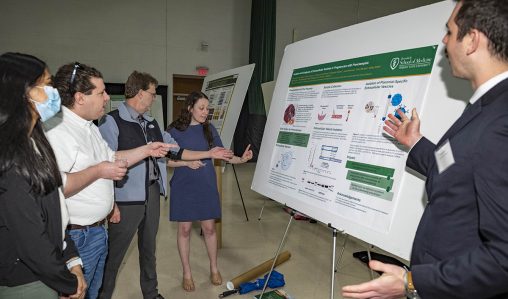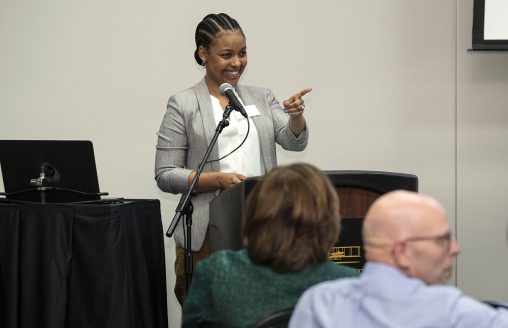
The Boonshoft School of Medicine Research Symposium included podium presentations by medical students and faculty members and a poster session featuring 58 research presentations. (Photos by Erin Pence)
Understanding why muscles periodically become paralyzed. Analyzing extracellular vesicles to screen for pregnancy-related disorders. Using anti-racism research to improve patient care in urban OB/GYN clinics.
These were the featured research topics presented by Wright State University medical students at the inaugural Boonshoft School of Medicine Research Symposium in the Student Union.
The April 6 symposium showcased research and scholarship from the School of Medicine, including podium presentations by three medical students and five faculty members and a poster session.
Valerie Weber, M.D., dean of the Boonshoft School of Medicine, said that research and scholarship are a part of the very fabric of a medical school. The pandemic has also shown the importance of research and the role it plays in advancing health care, she said.
Diagnostic tests, treatment modalities and vaccinations were made possible thanks to the “hard work of so many people who are dedicated to medical discovery,” Weber said. “It is in that spirit that we are here today.”
Weber encouraged medical students and faculty to be inspired by Dayton inventor Charles F. Kettering, who said, “research means that you don’t know but are willing to find out.”
“It’s fitting that here at Wright State we continue the strong tradition of curiosity and discovery,” Weber said.
The research symposium featured presentations by three recipients of Boonshoft School of Medicine medical student research awards:
- Christopher Dupont, a third-year medical student, presented on “Understanding Muscle Weakness in Hyperkalemic Periodic Paralysis.” As a former professional soccer player, Dupont became interested in studying muscle physiology, which he has pursued in the lab of Mark Rich, M.D., Ph.D., professor of neurology and professor of neuroscience, cell biology and physiology.
- Scout Bowman-Gibson, who is pursuing a dual degree M.D./Ph.D. in biomedical sciences: presented on “Isolation and Application of Extracellular Vesicles.” Bowman-Gibson conducts research into preeclampsia in the lab of Thomas L. Brown, Ph.D., associate chair for research in the Department of Neuroscience, Cell Biology and Physiology, and is interested in disease pathophysiology and diagnostic technology.
- Tonia Rhone, a third-year medical student: presented on “Patient-Centered Focus Groups as a Catalyst for Anti-Racism Research and Quality Improvement in an Urban Academic OB/GYN Clinic.” An aspiring OB/GYN, Rhone is interested in addressing racially disparate outcomes in medicine, improving institutional practices and developing new interventions. She is currently a member of the Black Maternal Health Leadership Team at Tufts University School of Medicine.

Recipients of Boonshoft School of Medicine medical student research awards, including Tonia Rhone, a third-year medical student, gave podium presentations.
The Research Symposium also featured four faculty research talks:
- Timothy Crawford, Ph.D., assistant professor of epidemiology and biostatistics in the departments of Population and Public Health Sciences and Family Medicine: “Exploring the Impact of Discrimination and HIV-related Stigma on Engagement in HIV Care: Findings from a Pilot Study among Older African Americans Living with HIV”
- Jason Miner, M.D., a trauma and acute care surgeon in the U.S. Air Force and faculty member at Wright State and Miami Valley Hospital: “Defining Mild Traumatic Brain Injury: Making the Leap from Research Definition to Clinical Practice”
- Sydney Silverstein, Ph.D., assistant professor in the Department of Population and Public Health Sciences, and Danielle Gainer, M.D., assistant professor of psychiatry and director of the Division of Research: “Rethinking Trauma-Informed Care: How Qualitative Research Can Inform Clinical Practice”
- Kwang-Jin Cho, Ph.D., assistant professor of biochemistry and molecular biology: “K-Ras plasma membrane interactions: a tractable therapeutic target”
The Apollo Room buzzed with excitement during the symposium’s poster session, which included 58 poster presentations by Boonshoft School of Medicine faculty, staff, graduate students, residents and medical students.
The Boonshoft School of Medicine combined its fall Central Research Forum and spring Medical Student Research Symposium into the new BSOM Research Symposium. The School of Medicine plans to hold the Research Symposium annually.
“Our vision is to help this event grow in future years. Such events help our students showcase their research and increase competitiveness for residency applications,” said Priya Small, research coordinator in the Department of Medical Education.

 Wright State University and Premier Health more closely align operations, creating a transformational partnership
Wright State University and Premier Health more closely align operations, creating a transformational partnership  Bottom Line, Wright State partnership aims to increase access to college
Bottom Line, Wright State partnership aims to increase access to college  Wright State’s nursing program celebrates 50th anniversary
Wright State’s nursing program celebrates 50th anniversary  Wright State celebrates Student Success Champions
Wright State celebrates Student Success Champions  Wright State golf team captures 2024 Horizon League team title, Flynn individual champion
Wright State golf team captures 2024 Horizon League team title, Flynn individual champion 